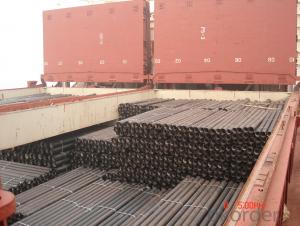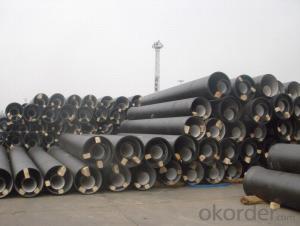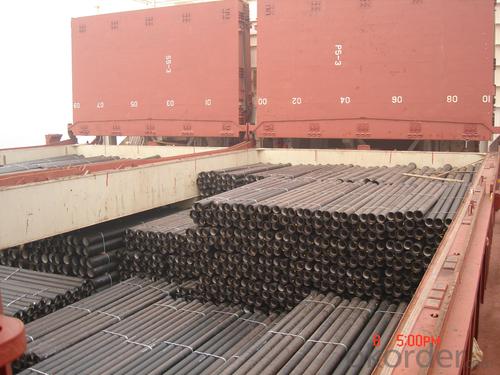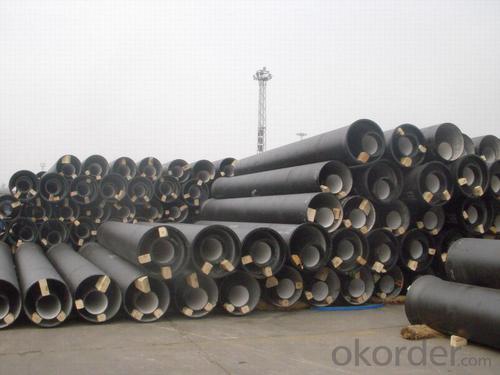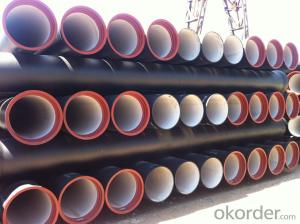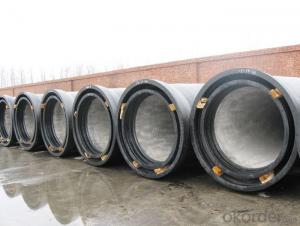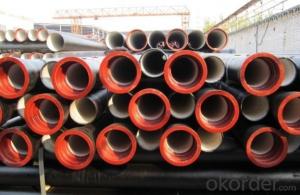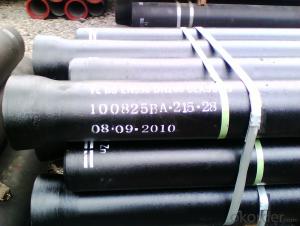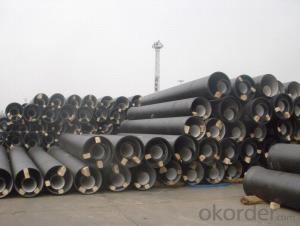Ductile Iron Pipe ISO2531:1998 C CLASS DN100
- Loading Port:
- China main port
- Payment Terms:
- TT or LC
- Min Order Qty:
- 20 m.t.
- Supply Capability:
- 100000 m.t./month
OKorder Service Pledge
OKorder Financial Service
You Might Also Like
1.Ductile Iron Pipe Description :
1) Pipes confirm to ISO2531,K9 class,T type joint,6m long,with inside cements lining conform to ISO4179, outside Zinc
spraying(130g/m2) and bitumen coating(70μm) conform to ISO8179.
2) Pipe ends: Spigot and socket ends, with 100% SBR rubber gaskets accoding to ISO4633
3) we can do third party inspection according to customer's request.
4) Our products have been sold to many international market, such as Middle East and South East Asia and Africa.
2.Main Features of the Ductile Iron Pipe:
1. Material: Ductile iron grade 500-7/ 450-10 in accordance with ISO1083
2. Standard: ISO 2531, EN545, EN598, ANSI, AWWA
3. Certificate: ISO9001, ISO14001, SGS, NSF, WRAS
4. Length: 6m or cut into 5.6m, 5.7m, 5.8m
5. Internal Lining: Cement, conform to ISO4179
6. External coating: Zinc + Bitumen, conform to ISO8179
3.Ductile Iron Pipe Images:
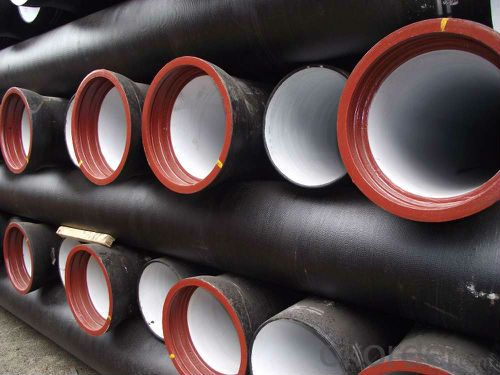
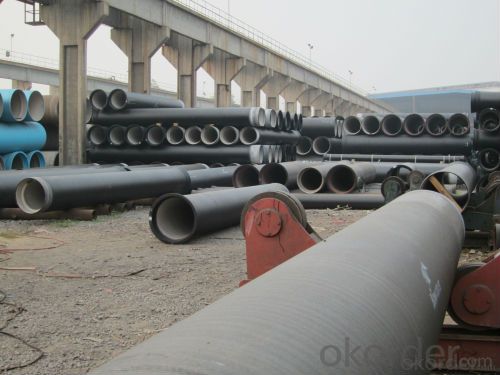
4.Ductile Iron Pipe Specification:
Standard: API SPEC 5L 44th eidtion,ASTM A252-98(2007)
Grade: A53 Grades A/B, ASTM A106 Grades B/C,ASTM A179 Weld Alternatives: LSAW
OD size range: 6.4~44.5mm
Wall thickness: 406.4~1422mm
Length: 3 - 12 m according to requirment
5.FAQ:
We have organized several common questions for our clients,may help you sincerely:
1.Q: Why would you choose ductile iron pipe rather than other pipe materials?
A:The reasons are obvious for that not only ductile iron pipe possesses the inherent strength and flexibility of ductile
iron, combined with proven corrosion protection systems, but also the cost savings can be achieved from design to
installation and commissioning.
2.Q:Why can you guarantee the inner of pipes can’t be corroded?
A: High alumina cement mortar lining and sulphate-resistant cement mortar lining. These two special linings are applicable
to inner anti-corrosion for sewage pipes, improving resistance to erosion of the sewage components.
- Q: What are the different types of ductile iron pipe joints?
- There are several types of ductile iron pipe joints, including push-on joints, mechanical joints, restrained joints, flanged joints, and grooved joints.
- Q: Can ductile iron pipes be used in high-temperature applications?
- Yes, ductile iron pipes can be used in high-temperature applications. Ductile iron pipes have a higher melting point compared to other types of pipes such as PVC or HDPE, making them suitable for carrying fluids at elevated temperatures. The material properties of ductile iron, including its strength, toughness, and resistance to thermal stress, enable it to withstand higher temperatures without deforming or failing. However, it is important to note that the specific temperature limit for ductile iron pipes may vary depending on factors such as the grade of ductile iron used, the pressure of the fluid being carried, and the duration of exposure to high temperatures. Therefore, it is crucial to consult the manufacturer's specifications and guidelines to ensure that ductile iron pipes are appropriately selected and installed for high-temperature applications.
- Q: Are ductile iron pipes suitable for installation in areas with high traffic loads?
- Yes, ductile iron pipes are suitable for installation in areas with high traffic loads. Due to their inherent strength and durability, ductile iron pipes can withstand heavy loads and are commonly used in applications where there is significant vehicular traffic.
- Q: How does ductile iron pipe resist internal corrosion?
- Ductile iron pipe resists internal corrosion due to the protective barrier formed by its cement lining. This lining acts as a barrier between the iron pipe and the transported fluid, preventing direct contact and minimizing the chances of corrosion. Additionally, the high carbon content in ductile iron enhances its corrosion resistance compared to other types of iron pipes.
- Q: Can ductile iron pipes be used for underground storage tanks?
- Under specific circumstances, ductile iron pipes are appropriate for underground storage tanks. This material possesses strength and durability, effectively resisting corrosion and making it a suitable option for underground applications. Nevertheless, several factors must be taken into account before implementing ductile iron pipes for underground storage tanks. First and foremost, it is vital to evaluate the project's precise demands and regulations. Different regions and industries may enforce specific guidelines regarding the materials used in underground storage tanks. It is imperative to ascertain that ductile iron pipes comply with these regulations and meet the required standards for underground storage. Secondly, the size and capacity of the storage tank must be considered. Ductile iron pipes are available in various sizes, but their dimensions may not be suitable for large-scale storage tanks due to limitations. Consulting engineers or experts is necessary to determine the appropriate pipe size and capacity for the specific storage requirements. Lastly, the design and installation of the underground storage tank necessitate careful planning. Adequate measures should be taken to seal and protect against external factors such as soil movements, water pressure, or other potential hazards. Preventive actions should be implemented to avoid leaks or damage to the pipes, ensuring the safety and longevity of the storage tank. In conclusion, ductile iron pipes can be utilized for underground storage tanks, but it is crucial to consider the specific requirements, regulations, sizing limitations, and proper design and installation. Seeking guidance from professionals in the field and adhering to industry standards will ensure successful implementation of ductile iron pipes for underground storage tanks.
- Q: How does ductile iron pipe perform in areas with high groundwater salinity?
- Ductile iron pipe performs well in areas with high groundwater salinity due to its inherent corrosion resistance properties. The high levels of salinity in the groundwater can cause corrosion and deterioration of certain materials, but ductile iron is highly resistant to this type of corrosion. Its composition and manufacturing process make it less susceptible to damage from corrosive elements, such as salt and minerals present in high salinity water. The corrosion resistance of ductile iron pipe is primarily attributed to its protective iron oxide coating, which forms naturally on the interior and exterior surfaces of the pipe. This coating acts as a barrier, preventing direct contact between the pipe and the corrosive elements in the groundwater. Additionally, ductile iron pipes are often lined with cement mortar or a protective epoxy coating, which further enhances their resistance to corrosion and provides an additional layer of protection. Furthermore, ductile iron pipe has a long lifespan, often exceeding 100 years, which makes it ideal for areas with high groundwater salinity. Its durability and resistance to corrosion ensure that it can withstand the harsh conditions associated with high salinity environments, minimizing the need for frequent repairs or replacements. In summary, ductile iron pipe is an excellent choice for areas with high groundwater salinity due to its corrosion resistance properties. Its protective iron oxide coating, coupled with optional linings, provides a reliable and long-lasting solution, ensuring the integrity and performance of the pipe system even in challenging environments.
- Q: How do ductile iron pipes handle soil erosion?
- Ductile iron pipes are known for their exceptional strength and durability, making them highly resistant to soil erosion. The material used in ductile iron pipes is specifically engineered to withstand the effects of soil erosion, ensuring a long-lasting and reliable infrastructure. The composition of ductile iron pipes includes a mix of iron, carbon, and other alloying elements, which provides the necessary strength and resilience to withstand the forces exerted by soil erosion. These pipes have a higher tensile strength than traditional cast iron pipes, allowing them to resist deformation and cracking under pressure. Furthermore, ductile iron pipes have a protective layer called cement mortar lining, which acts as a barrier between the pipe and the surrounding soil. This lining provides an additional layer of resistance against corrosion and erosion caused by the soil's chemical composition or abrasive particles. As a result, ductile iron pipes remain intact and continue to function effectively even in areas with high soil erosion rates. In terms of installation, ductile iron pipes are designed to be buried underground, ensuring that they are well-protected from direct contact with the soil. Additionally, their jointing systems are designed to provide a secure and watertight connection, minimizing the risk of soil infiltration and subsequent erosion. Overall, ductile iron pipes have a proven track record of effectively handling soil erosion due to their superior strength, protective linings, and appropriate installation techniques. They offer a reliable and long-lasting solution for water and wastewater infrastructure, even in areas prone to soil erosion.
- Q: What are the different coatings available for ductile iron pipe?
- There are several different coatings available for ductile iron pipe, each offering unique benefits and protection for various applications. Some of the most commonly used coatings include: 1. Cement Mortar Lining: This coating involves applying a layer of cement mortar to the interior surface of the pipe. It provides excellent resistance against corrosion and abrasion, making it suitable for transporting water and sewage. 2. Bituminous Coating: Bituminous coatings consist of a layer of asphalt or coal tar pitch applied to the pipe surface. This coating offers good protection against corrosion and is often used for underground pipes in water and wastewater systems. 3. Fusion-Bonded Epoxy (FBE) Coating: FBE coatings are created by electrostatically applying a layer of epoxy powder to the pipe surface, followed by curing it at high temperatures. This coating provides exceptional resistance against corrosion and is commonly used in applications where the pipe is exposed to harsh environments or corrosive substances. 4. Polyurethane Coating: Polyurethane coatings offer excellent resistance against abrasion, impact, and corrosion. They are often used for pipes that are exposed to abrasive materials or require additional protection against external damage. 5. Zinc Coating: Zinc coatings, also known as galvanized coatings, involve applying a layer of zinc to the pipe's surface. This coating provides excellent protection against corrosion, making it suitable for pipes that are exposed to moisture and aggressive environments. 6. Polyethylene Encasement: Polyethylene encasement involves wrapping the pipe with a layer of polyethylene film or tape. This coating provides a physical barrier against corrosion and is commonly used in conjunction with other coatings for added protection. It is essential to consider the specific requirements of the application, such as the type of fluid being transported and the environmental conditions, to determine the most suitable coating for ductile iron pipes.
- Q: What are the differences between cast iron pipes W and A?
- Cast iron drainage pipe generally divided into three categories, namely W type socket cast iron pipes, cast iron pipes of A type, B type cast iron drainage pipe, the three pipes have good seismic performance, strong sealing performance, simple construction, convenient maintenance, reliable use, so it is also called the cast iron pipe for earthquake.
- Q: Which is good for water polo cast iron pipe steel pipe?
- The advantage of ductile iron pipe is cheap, corrosion resistance, lack of toughness is poor, not easy to process
Send your message to us
Ductile Iron Pipe ISO2531:1998 C CLASS DN100
- Loading Port:
- China main port
- Payment Terms:
- TT or LC
- Min Order Qty:
- 20 m.t.
- Supply Capability:
- 100000 m.t./month
OKorder Service Pledge
OKorder Financial Service
Similar products
Hot products
Hot Searches
Related keywords
